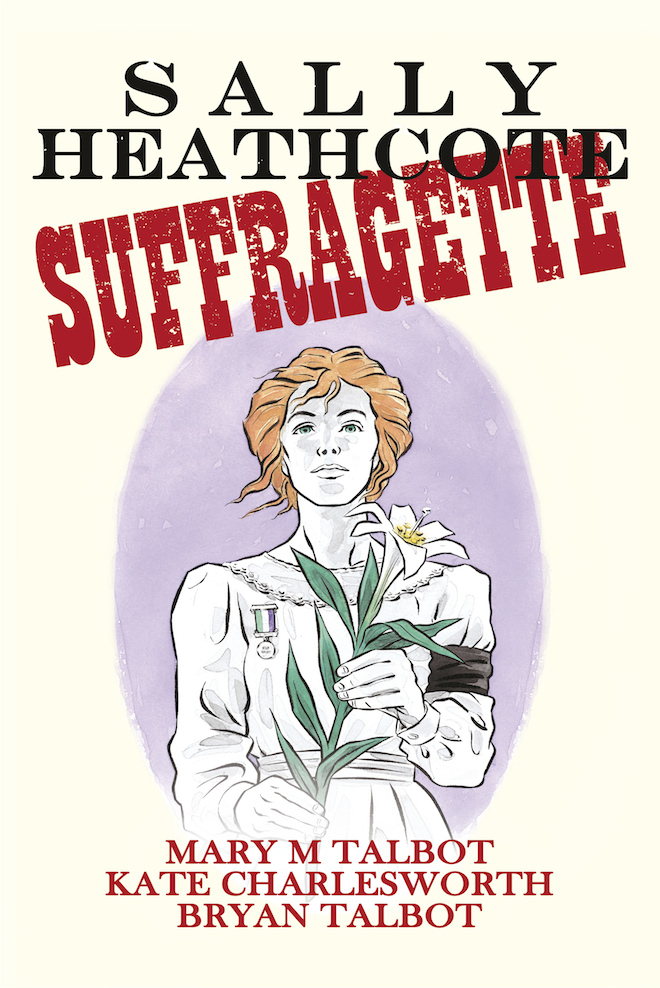Anna-Marie Fitzgerald and Phoebe Frangoul are the co-editors and co-founders of the London grrrl-zine and literary salon Pamflet. Here they discuss the releases, trends and going’s on in the literary world worth knowing about. Follow them on Twitter and Instagram @Pamflet.
Happy birthday John Lewis and three provocative holiday reads in this month’s Pamflet x Twin books roundup…
Sally Heathcote: Suffragette by Mary Talbot, Kate Charlesworth and Bryan Talbot
Graphic novels are just such good value – great writing AND beautiful visuals to add another dimension to the reading experience – what’s not to like? Sally Heathcote: Suffragette (£ 16.99, Jonathan Cape) by Mary Talbot, Kate Charlesworth and Bryan Talbot tells the story of a young working class woman who becomes part of the suffrage movement and rubs shoulders with its biggest personalities – the Pankhursts and Emily Davison – and some others I hadn’t heard of before.
Much is made of the often bitter infighting between the various factions of fourth wave feminists, in particular the undignified way it can play out on social media, so in a funny way it’s quite reassuring to discover, on reading Sally Heathcote: Suffragette, ‘twas ever thus. Personality clashes and petty jealousies existed between the leading proponents of the suffragette movement, but in no way does that take away from their astonishing achievements – in fact a bit of healthy dissent amongst the troops probably helped strengthen their cause – a lesson that should give fourth wavers heart.
Alongside Sally’s story, there’s a parallel narrative that traces the developing suffrage movement, from the early days of pamphleteering and disrupting public meetings, to the more hardcore acts of civil disobedience. The power and passion of the campaign is vividly brought to life by the dynamic illustrations, nowhere more effectively than in a particularly brutal series of drawings that drive home the horror and humiliation of the force-feeding that the suffragettes endured in prison. There’s a twist in this tale that’ll hopefully leave anyone who ‘didn’t get round’ to voting in the recent elections feeling suitably ashamed.
A Very British Revolution: 150 Years of John Lewis by Jonathan Glancey
Anyone who’s stepped into the hallowed halls of John Lewis and given themselves up to its comforting, mum-like embrace will appreciate that 2014 is a significant year for this national treasure. JL is celebrating its 150th birthday with special edition products, by opening up the roof terrace on the Oxford Street building to the public (it’s previously been an oasis for JL partners) and with the publication of A Very British Revolution: 150 Years of John Lewis (Laurence King, £20).
While this is pretty much a bible for JL obsessives, tracing as it does the evolution of the brand from its birth in 1864, it’s much more than that – it’s a social history, a study in Englishness. For we are, after all, a nation of shopkeepers and no one fits that description more accurately than John Lewis himself, the archetypal self-made man. We learn how the orphaned John was apprenticed to a draper, found his way to London and built up his own business slowly but surely (in contrast to the flashier William Whiteley down the road). He had a sad romance (his beloved’s family considered him too lowly a prospect), before eventually marrying Eliza Mills, one of the first female undergrads at Cambridge and he ruled his kingdom with a stern, firm hand.
John Lewis’ personal and professional story is told against a fascinating backdrop of British history, from the Victorian era’s energy and confidence, though the suffrage movement, the general strike, two world wars, the post-war rebuilding period and the social revolution of the sixties to the London 2012 Olympics. Art, architecture, fashion, technology and politics play their part in this story and it’s beautifully told through illustrations, photographs and Jonathan Glancey’s crisp, insightful prose.
The Empathy Exams: Essays by Leslie Jamison
Iowa Writers’ Workshop was immortalised in Girls series two and The Empathy Exams (Granta, £12.99) is an example of how it’s reached cult-TV-reference-status. Course alumnus Leslie Jamison writes essays in the way (it seems) that mostly only American writers have the space to do and in her first collection she proves herself a mistress of the form. She meditates on her subjects – the wounded, the wrongly accused, the heartbroken, and the downright wild – with intense curiosity and wonder. Universal themes emerge from the pieces, but her experiences and writing style are exclusively those of a twenty-something woman and she might confidently reference The Lost Boys in one breath and a classical philosopher in the next. This mix of low and high cultures, contemporary and ancient, intimate and public makes her writing and subjects shockingly fresh and new. Think Sloane Crosley in a deep and contemplative email exchange with Susan Sontag.



 Twitter
Twitter
 Tumblr
Tumblr
 YouTube
YouTube
 Facebook
Facebook
 Instagram
Instagram
